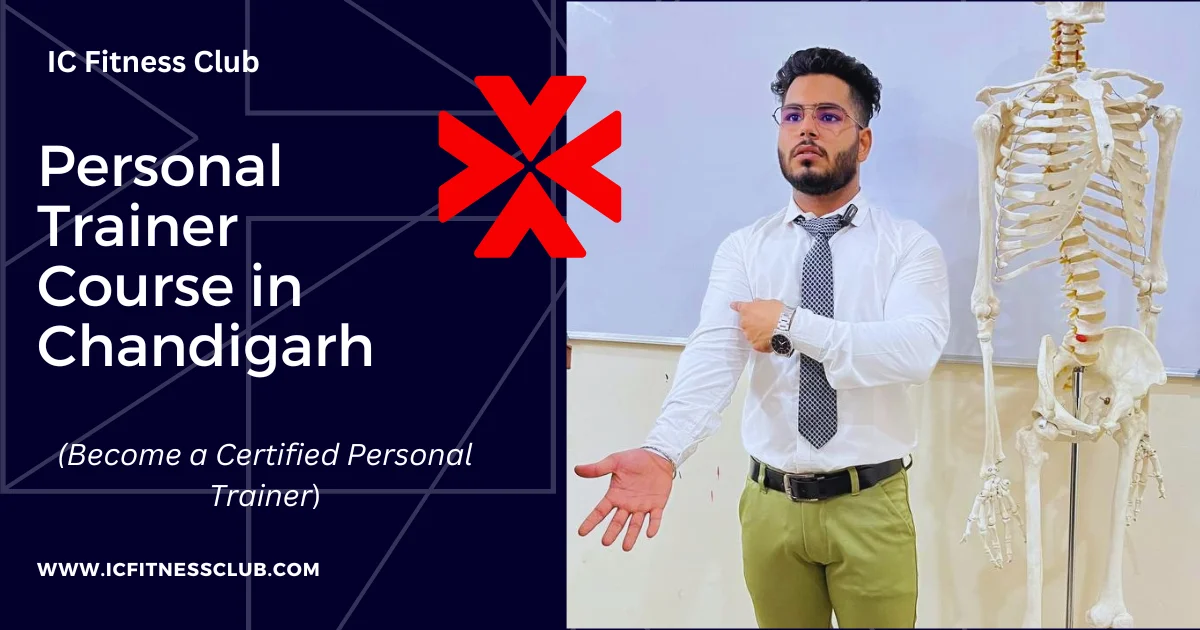Personal Trainer Course in Chandigarh Punjab – IC Fitness Club
A personal trainer course is a program designed to teach individuals the skills and knowledge needed to become certified personal trainers. Here are some of the typical components of a personal trainer course:
- Anatomy and Physiology: This covers the basic structure and function of the human body, including bones, muscles, organs, and systems.
- Exercise Physiology: This covers the effects of exercise on the human body, including energy expenditure, cardiovascular health, and muscle growth.
- Fitness Assessment: This covers techniques for assessing a client’s fitness level, including measuring body composition, cardiovascular endurance, and muscular strength and endurance.
- Exercise Programming: This covers the design and implementation of exercise programs for individuals with different fitness levels and goals.
- Nutrition: This covers the principles of nutrition and its impact on health and fitness.
- Business and Marketing: This covers the skills and knowledge needed to start and run a successful personal training business, including client acquisition and retention, financial management, and liability insurance.
- Special Populations: This covers the unique considerations for working with specific groups of clients, such as older adults, athletes, and those with medical conditions.
It’s important to note that in order to become a certified personal trainer, you typically need to pass an IC certification exam.
Topics covered in Personal Trainer Course
A personal trainer course typically covers the following topics:
- Anatomy and Physiology: Understanding the structure and function of the human body, including bones, muscles, organs, and systems.
- Exercise Physiology: Understanding the effects of exercise on the body, including energy expenditure, cardiovascular health, and muscle growth.
- Fitness Assessment: Techniques for assessing a client’s fitness level, including measuring body composition, cardiovascular endurance, and muscular strength and endurance.
- Exercise Programming: Designing and implementing exercise programs for individuals with different fitness levels and goals.
- Nutrition: The principles of nutrition and its impact on health and fitness.
- Business and Marketing: The skills and knowledge needed to start and run a successful personal training business, including client acquisition and retention, financial management, and liability insurance.
- Special Populations: Unique considerations for working with specific groups of clients, such as older adults, athletes, and those with medical conditions.
- Injury Prevention and Management: Understanding common injuries and how to prevent and manage them, as well as the basics of rehabilitation and exercise prescription.
- Behavioral Change and Motivation: Techniques for helping clients adopt and maintain healthy behaviors, as well as methods for promoting long-term adherence to an exercise program.
- Professional Development and Ethics: Building a successful personal training career, including effective communication skills, time management, and ethical considerations.
Scope for a Personal Trainer
The scope of a personal trainer is to help individuals improve their physical fitness and achieve their health and wellness goals through exercise and lifestyle modifications. Personal trainers work one-on-one with clients, or in small groups, to design and implement safe and effective exercise programs that meet their specific needs and goals.
The scope of a personal trainer includes the following responsibilities:
- Conducting fitness assessments: Personal trainers assess their clients’ current fitness levels and use the information to design personalized exercise programs.
- Developing exercise programs: Personal trainers design and implement safe and effective exercise programs that meet the needs and goals of each individual client.
- Monitoring progress: Personal trainers monitor their clients’ progress and make adjustments to their exercise programs as needed to ensure they are making progress toward their goals.
- Providing instruction and motivation: Personal trainers provide instruction on proper exercise technique and form, as well as motivate and encourage their clients to stick to their exercise programs.
- Addressing health and wellness: Personal trainers often discuss the importance of good nutrition and lifestyle habits and may provide advice and guidance on these topics to their clients.
- Managing client relationships: Personal trainers develop and maintain positive relationships with their clients, and provide ongoing support and encouragement to help them achieve their goals.
The scope of a personal trainer can also vary depending on their work setting, whether it is in a gym, studio, or as a self-employed contractor. Regardless of the work setting, personal trainers are expected to have a high level of knowledge and expertise in the fields of anatomy, exercise physiology, and nutrition, as well as strong interpersonal and motivational skills.
Responsibility of a Personal Trainer Include
- Conducting fitness assessments: Personal trainers assess their clients’ current fitness levels, including body composition, cardiovascular endurance, and muscular strength and endurance, and use this information to design personalized exercise programs.
- Developing exercise programs: Personal trainers design and implement safe and effective exercise programs that meet the needs and goals of each individual client.
- Monitoring progress: Personal trainers monitor their clients’ progress and make adjustments to their exercise programs as needed to ensure they are making progress towards their goals.
- Providing instruction and motivation: Personal trainers provide instruction on proper exercise technique and form, as well as motivate and encourage their clients to stick to their exercise programs.
- Addressing health and wellness: Personal trainers often discuss the importance of good nutrition and lifestyle habits and may provide advice and guidance on these topics to their clients.
- Managing client relationships: Personal trainers develop and maintain positive relationships with their clients, and provide ongoing support and encouragement to help them achieve their goals.
- Maintaining safety: Personal trainers are responsible for ensuring that their clients are performing exercises safely and effectively, and for modifying exercises as needed to prevent injury.
- Staying current with industry trends and best practices: Personal trainers stay informed of new developments in the field of exercise and nutrition and continually seek opportunities for professional development and growth.
- Complying with legal and ethical standards: Personal trainers must comply with relevant laws and regulations, as well as professional ethical standards when working with clients.
In addition to these core responsibilities, the specific responsibilities of a personal trainer may vary depending on their work setting, such as in a gym, studio, or as a self-employed contractor. Regardless of the work setting, personal trainers are expected to have a high level of knowledge and expertise in the fields of anatomy, exercise physiology, and nutrition, as well as strong interpersonal and motivational skills.
To become a personal trainer, there are a few key eligibility criteria that you need to meet. These include:
- Age: You must be at least 18 years old.
- Education: You typically need to have a high school diploma or equivalent. Some personal trainer certification programs may require a higher level of education, such as a college degree.
- Physical fitness: Personal trainers need to be in good physical condition, as they will be demonstrating exercises and serving as role models for their clients.
- Liability insurance: Personal trainers should have liability insurance to protect themselves and their clients in the event of an injury.
- First aid and CPR certification: Personal trainers should be certified in first aid and CPR in case of an emergency.
- Communication skills: Personal trainers should have strong interpersonal and communication skills, as they will be working directly with clients and helping them achieve their goals.
- These eligibility criteria can vary depending on the jurisdiction and type of personal training, so it is important to research the specific requirements in your area. By meeting these criteria and obtaining the appropriate certifications and insurance, you can become a qualified and successful personal trainer.
for further details about the personal trainer course, visit below





